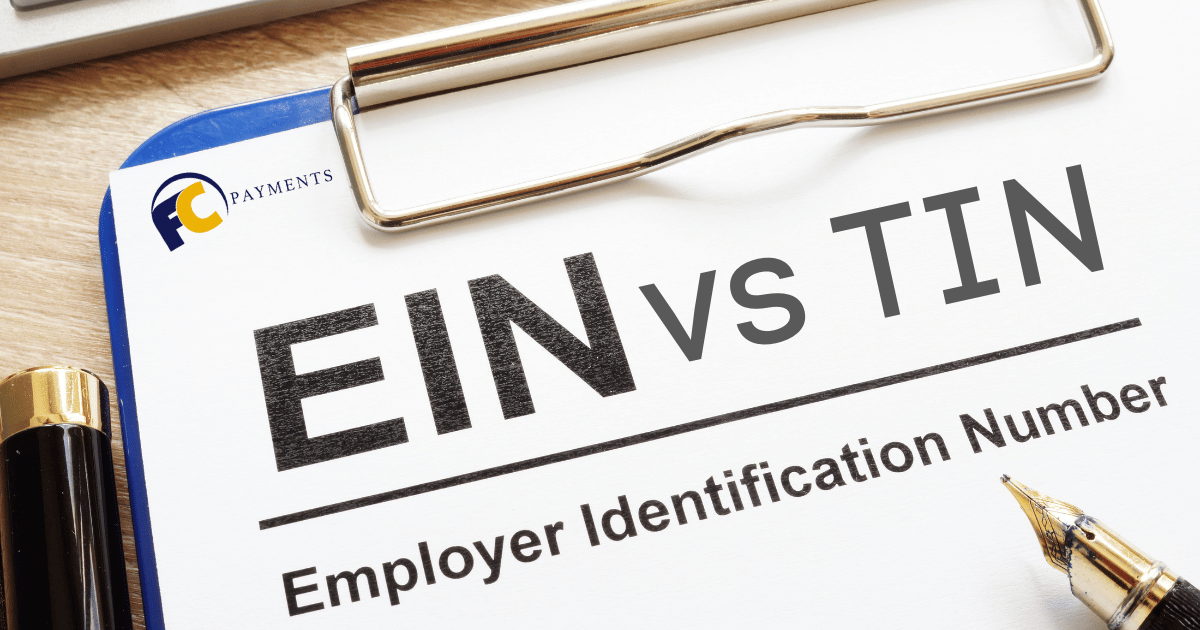
TIN vs EIN: The Vital Differences You Need to Know
TIN vs EIN: The Vital Differences You Need to Know
Navigating the world of tax identification numbers can be a daunting task for both individuals and businesses. This is all separate from your Merchant ID number. With acronyms like TIN, EIN, ATIN, and PTIN, it’s easy to get lost in the alphabet soup. However, understanding the vital differences and similarities between these numbers is crucial for tax compliance and financial management.
In this blog post, our high risk merchant account providers discuss a fresh perspective on the distinctions between TIN and EIN, as well as their importance for various tax-related purposes, by exploring the topic of “tin vs ein”.
Quick Summary
- TIN and EIN are distinct tax identification numbers with different purposes but issued by the same agencies to aid in taxation.
- Sole proprietorships or LLCs without employees may use a personal SSN for filing taxes, yet should consider potential risks associated.
- Other types of TIN, such as ATIN and PTINS, exist to ensure compliance with federal regulations when needed.
Understanding TIN and EIN: The Basics
Tax identification numbers (TIN) and employer identification numbers (EIN) are essential tools used by the Internal Revenue Service (IRS) and the Social Security Administration (SSA) for tax-related purposes. While TINs are allocated to individuals, EINs are assigned to businesses. These numbers play a critical role in filing tax returns and other federal tax identification number-related documents, ensuring compliance with tax laws and regulations.
TIN and EIN are umbrella terms that encompass several types of taxpayer identification numbers. For individuals, this includes Social Security numbers (SSN), individual taxpayer identification numbers (ITIN), adoption taxpayer identification numbers (ATIN), and preparer taxpayer identification numbers (PTIN). On the other hand, businesses utilize EINs, which are nine-digit numbers issued by the IRS, to identify their entity for tax filing and other legal purposes.
What is a TIN?
A Taxpayer Identification Number (TIN) is an identification number issued by the IRS or SSA that includes various types such as a Social Security Number (SSN), Individual Taxpayer Identification Number (ITIN), Adoption Taxpayer Identification Number (ATIN), and Preparer Taxpayer Identification Number (PTIN) for business tax returns. TINs are used to identify individuals subject to taxation in the United States, ensuring that tax obligations are met in accordance with federal regulations.
Each type of TIN serves a specific purpose. For example, an SSN is issued by the SSA to all U.S. citizens for tax-related and other functions. ITINs are designated for nonresident aliens, their spouses, and dependents who cannot obtain an SSN but are required to file a federal income tax return. To obtain an ITIN, individuals must complete IRS Form W-7 and submit documentation verifying their foreign or alien status and identity.
What is an EIN?
A Federal Employer Identification Number (EIN) is a 9-digit number assigned to businesses for tax filing and other legal purposes. EINs are necessary for businesses to file their tax returns, open business checking accounts, and obtain necessary licenses. The format of an EIN is XX-XXXXXXXXXX, making it easily distinguishable from other types of taxpayer identification numbers.
Various types of business entities require an EIN, including non-profits, estates of decedents, employers, corporations, partnerships, governmental agencies, and trusts. EINs serve as the unique identifier for businesses in their interactions with the IRS and other government agencies, ensuring proper tax compliance and accurate recordkeeping.
Comparing TIN and EIN: Key Differences and Similarities
Although TIN and EIN share some characteristics as tax identification numbers, they serve distinct purposes. TINs are used to identify individuals who are subject to taxation in the United States, while EINs are utilized to identify businesses. Understanding the key differences and similarities between TIN and EIN is important for both individuals and businesses to ensure proper tax compliance and recordkeeping.
A major difference between TIN and EIN lies in their intended users. TINs are employed for personal tax purposes, while EINs are designated for businesses and employers. Despite their distinct purposes, both TIN and EIN share some characteristics, such as being issued by the IRS or SSA for tax identification purposes. They serve as unique identifiers for individuals and businesses in their interactions with government agencies, helping to maintain accurate tax records and compliance.
Distinct Purposes
TINs are used for individual taxation purposes, encompassing various types such as SSNs for U.S. citizens, ITINs for nonresident aliens, ATINs for adoptive parents, and PTINs for paid tax preparers. These identification numbers help individuals file tax returns, claim dependents, and ensure compliance with federal tax laws and regulations.
On the other hand, EINs are specifically designed for businesses and employers. Businesses utilize EINs to file their tax returns, open business bank accounts, and obtain necessary licenses and permits. EINs enable the IRS and other government agencies to effectively track and monitor business entities for tax compliance and other legal purposes.
Shared Characteristics
Although TIN and EIN serve different purposes, they share some similarities as tax identification numbers. Both TIN and EIN are used for tax identification purposes and are issued by the IRS or SSA. They help maintain accurate tax records by providing unique identifiers for individuals and businesses, ensuring proper tax compliance and recordkeeping.
Another common characteristic between TIN and EIN is their format. Both types of numbers typically consist of nine digits, making them easily distinguishable from other identification numbers. This standardized format enables the IRS and SSA to efficiently process tax returns and other tax-related documents, ensuring accurate and timely tax compliance.
Obtaining a TIN or EIN: Application Processes
The application processes for TIN and EIN differ, as each type of tax identification number requires specific forms and documentation. For individuals seeking a TIN, they must complete the appropriate form (SS-5 for SSN, W-7 for ITIN) and provide the necessary documentation to prove their identity and, if applicable, their foreign status.
In the case of businesses, they must complete Form SS-4 to obtain an EIN. By understanding the different application processes for TIN and EIN, individuals and businesses can ensure they obtain the correct tax identification number for their specific needs. This, in turn, helps maintain accurate tax records and compliance with federal tax laws and regulations.
How to Get a TIN
To obtain a TIN, individuals must first determine the specific type of TIN they require (SSN, ITIN, ATIN, or PTIN).
- For an SSN, individuals must submit Form SS-5, Application for a Social Security Card, to the Social Security Administration, along with the necessary documentation to prove their identity, age, and citizenship or immigration status.
- For an ITIN, individuals must complete IRS Form W-7, Application for IRS Individual Taxpayer Identification Number, and submit the required documentation to verify their foreign or alien status and identity.
- Once the appropriate form and documentation have been submitted, the IRS or SSA will process the application and issue the TIN, allowing individuals to file their tax returns and comply with federal tax laws.
How to Get an EIN
Businesses seeking an EIN must complete Form SS-4, Application for Employer Identification Number, and submit it to the IRS. There are several methods available for applying for an EIN, including online, by mail, by phone, or by fax.
- Applying online through the IRS website is the most expedient way to obtain an EIN, as businesses typically receive their EIN within seven business days.
- When applying for an EIN, businesses must provide accurate information about their entity type, ownership structure, and other relevant details to ensure proper tax compliance and recordkeeping.
- Once the application is processed, the IRS will issue the EIN, allowing businesses to file their tax returns, open business bank accounts, and obtain necessary licenses and permits.
Business Entity Considerations: When to Use TIN or EIN
Business owners must consider whether to use a TIN or EIN based on their specific business structure and employee status. For some business entities, such as sole proprietorships and LLCs without employees, the owner’s personal SSN can be used for tax filing purposes instead of an EIN. However, businesses with employees are required to obtain an EIN for tax filing and other legal purposes.
By understanding the differences between TIN and EIN and their respective purposes, business owners can ensure they obtain the appropriate tax identification number for their entity. This not only helps maintain accurate tax records but also ensures compliance with federal tax laws and regulations.
Sole Proprietorships and LLCs
Sole proprietorships and LLCs without employees can use the owner’s personal SSN when filing taxes instead of an EIN. This is because these types of business entities are not considered separate legal entities for tax purposes, and, as such, the owner’s personal tax identification number is sufficient for filing taxes.
However, business owners should be aware of the potential risks associated with using their personal SSNs for business tax filing purposes, such as identity theft and loss of privacy. In such cases, obtaining an EIN may be a more secure option for tax compliance and recordkeeping.
Businesses with Employees
For businesses with employees, an EIN is required for tax filing and other legal purposes. This includes businesses that hire employees, such as corporations, partnerships, non-profits, and trusts. The EIN serves as the unique identifier for these businesses, allowing the IRS and other government agencies to accurately track and monitor their tax compliance and financial activities.
Obtaining an EIN is not only necessary for tax compliance but also for other legal purposes, such as opening a business bank account, obtaining business licenses and permits, and establishing credit for the business entity. By obtaining an EIN, businesses with employees ensure proper tax compliance and recordkeeping while also protecting the owner’s personal tax identification information.
Other Tax Identification Numbers: A Brief Overview
In addition to TIN and EIN, there are other tax identification numbers that serve specific purposes. These include the Adoption Taxpayer Identification Number (ATIN) for adoptive parents and the Preparer Tax Identification Number (PTIN) for paid tax preparers. Understanding the various types of tax identification numbers and their purposes can help individuals and businesses navigate the complexities of tax compliance and recordkeeping.
By familiarizing themselves with these additional tax identification numbers, individuals and businesses can better understand the tax landscape and ensure they have the appropriate identification numbers for their specific needs. This, in turn, helps maintain accurate tax records and compliance with federal tax laws and regulations.
Adoption Taxpayer Identification Number (ATIN)
An Adoption Taxpayer Identification Number (ATIN) is a temporary 9-digit number issued by the IRS for adoptive parents who are unable to obtain an SSN for their adopted child in time for tax filing. The ATIN allows adoptive parents to claim the child as a dependent on their tax returns before the adoption is finalized.
Adoptive parents who need an ATIN must submit Form W-7A. This form is known as the Application for Taxpayer Identification Number for Pending U.S. Adoptions. The ATIN is a temporary identifier that is replaced by the child’s permanent SSN once it is issued by the SSA following the finalization of the adoption.
Preparer Tax Identification Number (PTIN)
A Preparer Tax Identification Number (PTIN) is a mandatory identification number for paid tax preparers who file taxes on behalf of others. The PTIN serves as the unique identifier for these professionals, allowing the IRS to track and monitor their tax preparation activities and ensure compliance with tax laws and regulations.
To register with the IRS, paid tax preparers must obtain a PTIN. This can be done either online or by submitting Form W-12, also known as the IRS Paid Preparer Tax Identification Number (PTIN) Application and Renewal. By obtaining a PTIN, a paid tax preparer demonstrates their compliance with IRS regulations and professional standards while protecting their clients’ personal tax identification information.
First Card Payments
First Card Payments is a full-service high-risk merchant account provider that offers a wealth of experience and expertise in navigating the complexities of TIN and EIN requirements. Their services include helping businesses understand TIN and EIN requirements, offering solutions for businesses with bad credit, and providing approval within 24-48 hours.
By partnering with First Card Payments, businesses can simplify their tax identification number requirements and enjoy a 25% discount on fees.
Full Summary
Understanding the vital differences and similarities between TIN and EIN is crucial for both individuals and businesses to ensure proper tax compliance and financial management. By familiarizing themselves with the various types of tax identification numbers, their specific purposes, and application processes, individuals and businesses can navigate the complexities of tax compliance with confidence. With the help of trusted partners like First Card Payments, businesses can simplify their tax identification number requirements and focus on their core operations, ensuring success and growth in today’s competitive marketplace.
Frequently Asked Questions
Is an EIN the same as a TIN?
No, EIN and TIN are not the same. An EIN is used to identify companies for taxation purposes, while a TIN is used to identify individuals. As such, they are used for different purposes and cannot be considered the same.
What is the difference between EIN and TIN and SSN?
An Employer Identification Number (EIN) is used for filing tax returns for businesses, while a Social Security Number (SSN) is for individuals. Both are types of Tax Identification Numbers (TIN).
How do I find my EIN or TIN?
If you can’t find your EIN on any documents, the best place to start is by calling the IRS Business & Specialty Tax Line at 800-829-4933. You can also look for it on documents like old tax returns or loan applications.
If you need to locate another company’s EIN, you can ask the company directly.
What are the other types of tax identification numbers besides TIN and EIN?
Adoptive parents can use the Adoption Taxpayer Identification Number (ATIN), and paid tax preparers can use the Preparer Tax Identification Number (PTIN) as alternative tax identification numbers.
I am passionate about delivering results and helping my clients succeed. With my expertise in SEO, branding, and marketing, I lead the agency’s efforts to create and implement effective strategies that drive business growth. Our all-inclusive approach sets us apart from other digital media companies and ensures that our clients receive the full range of services they need for online success. If you can think of it, we can build it!
Zulu Shack Creative team members thrive on momentum. Like Zulu warriors, we strive to spearhead your idea with speed and quality.
When I’m not helping my team implement new digital marketing strategies, I enjoy playing music, hosting poker nights, reading Stephen King novels, and spending time with my wife and baby daughter.
No Comments
Sorry, the comment form is closed at this time.










